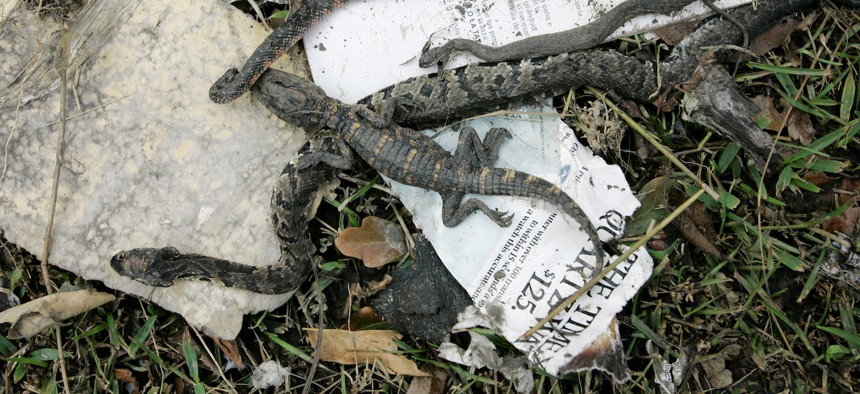What 35 Inches of Rain Can Dredge Up

A baby alligator and several snakes are seen dead in a debris pile, Friday, Sept. 19, 2008, in Bridge City, Texas following Hurricane Ike. Tony Gutierrez / AP File Photo
Hurricane Harvey’s unusual path could hit Houston with rain and storm surges at the same time—surfacing gators, snakes, sewage, and coffins.
Hurricane Harvey is expected to hit Corpus Christi, Texas, late on Friday, and that will just be the start of it.
Over the next four or five days, the slow-moving storm could dump up to 35 inches of rain over the hardest-hit areas of Texas. Looking at a NOAA forecast this morning, meteorologist and writer Eric Holthaus tweeted,“This is scary. I have never seen a rainfall forecast like this in my entire career.”
All this is compounded by the unusual curve of Harvey’s projected path. After the hurricane makes landfall at Corpus Christi, it is expected to go back out toward the ocean and then make landfall second time near Houston. Hurricane flooding usually comes from some combination of rain and ocean water pushed inland by heavy winds.
“Usually, you don’t get peak rainfall and peak surge at the same time,” says Samuel Brody, a flood expert at Texas A&M University. If the forecast holds for Houston, rainwater would be running down streams and rivers while ocean water is surging up to meet it. In other words, that unprecedented amount of rain will have nowhere to go. “That would add catastrophe on top of catatrasophe,” says Brody.
There will be a lot of water, yes, but plenty of other consequences, too. Floods have habit of surfacing things we’d rather stay hidden.
Humans, for example, aren’t the only ones looking for higher ground. Alligators are too. Rising waters have also carried snakes from their natural habitats to where humans congregate.
In New Orleans, floodwaters from Hurricane Katrina unearthed nearly a thousand coffins and vaults, sending the dead miles along the coast. “Coffins were torn out of mausoleums like a child’s blocks,” Louisiana’s emergency medical director told The New York Times.
Overloaded sewage systems will start spewing raw sewage. The city of Houston pretty much admitted in 2015 that there’s nothing they can do to prevent sewage spills after heavy rains. Residents have been advised before to boil water.
A large metro area like Houston is also particularly vulnerable to flooding. Large swathes of the city are concrete and asphalt, which prevents rainwater from properly draining. It doesn’t help that Houston is naturally a low-lying city with clay soil that doesn’t drain well anyway. The drainage system the city has built is outdated, engineered to to withstand only a 10-year flood.
The Houston Ship Channel is also vulnerable to flooding from storm surges. As my colleague David Graham notes, it is a major center for the petrochemical industry, and flooding could spill millions of gallons of crude oil.
By the time Hurricane Harvey is all over, Texas may have much more than water to deal with.
Sarah Zhang is a staff writer at The Atlantic, where this article was originally published.
NEXT STORY: Microsoft adds analytical services to Azure Government





